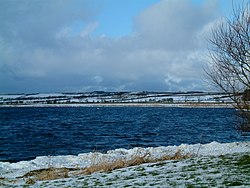Watten
| Watten | |
| Caithness | |
|---|---|
 Loch Watten | |
| Location | |
| Grid reference: | ND242544 |
| Location: | 58°28’31"N, 3°18’3"W |
| Data | |
| Post town: | Thurso |
| Postcode: | KW14 |
| Local Government | |
| Council: | Highland |
| Parliamentary constituency: |
Caithness, Sutherland and Easter Ross |
Watten is a small village in Caithness, on the main road (the A882 and A9) between the county’s two towns: Wick and Thurso. Watten is about eight miles west of Wick and close to Wick River and to Loch Watten.
The village is on The Far North railway line but trains stopped calling at the village in 1960. The railway station is now a private house.
The village is within the Parish of Watten, which has the Parish of Bower to the north, that of Wick to the east, that of Latheron to the south and that of Halkirk to the west.
Loch Watten
Loch Watten is the largest body of water in Caithness. The name of the village and loch appear to come from the Old Norse Vatn, meaning water or lake. The loch is famous for its brown trout fishing. The local public house is also named "The Brown Trout" after the local produce.
Prisoner of war camp
A military camp was built in Watten during Second World War, in early 1943, and at the end of the war this became POW Camp 165.[1] This had been described as "Britain's most secretive prisoner of war camp" because many prominent Nazis were moved there from POW Camp 21 at Comrie in Perthshire.[2][3] These prisoners included Gunter d'Alquen, Himmler's chief propagandist, leading U-boat captain Otto Kretschmer, dubbed the "Wolf of the Atlantic", and SS-Sturmbannführer Max Wünsche, one of Hitler's top aides. The camp closed in 1948.
Alexander Bain monument
Watten was the birthplace of Alexander Bain, the inventor of a type of pendulum-regulated electric clock and of the fax machine. Bain is commemorated by a carved stone monument outside the village hall. The fax machine is referred to on this monument as "The Electric Printing Telegraph".
References
- ↑ PRISONER OF WAR CAMPS (1939 – 1948), English Heritage 2003
- ↑ Camp 165 Watten Scotland's Most Secretive Prisoner of War Camp, Valerie Campbell, Whittles Publishing 2008, ISBN 978-1-904445-60-9
- ↑ New book provides insight into Watten POW camp, John O'Groat Journal 14 December 2007